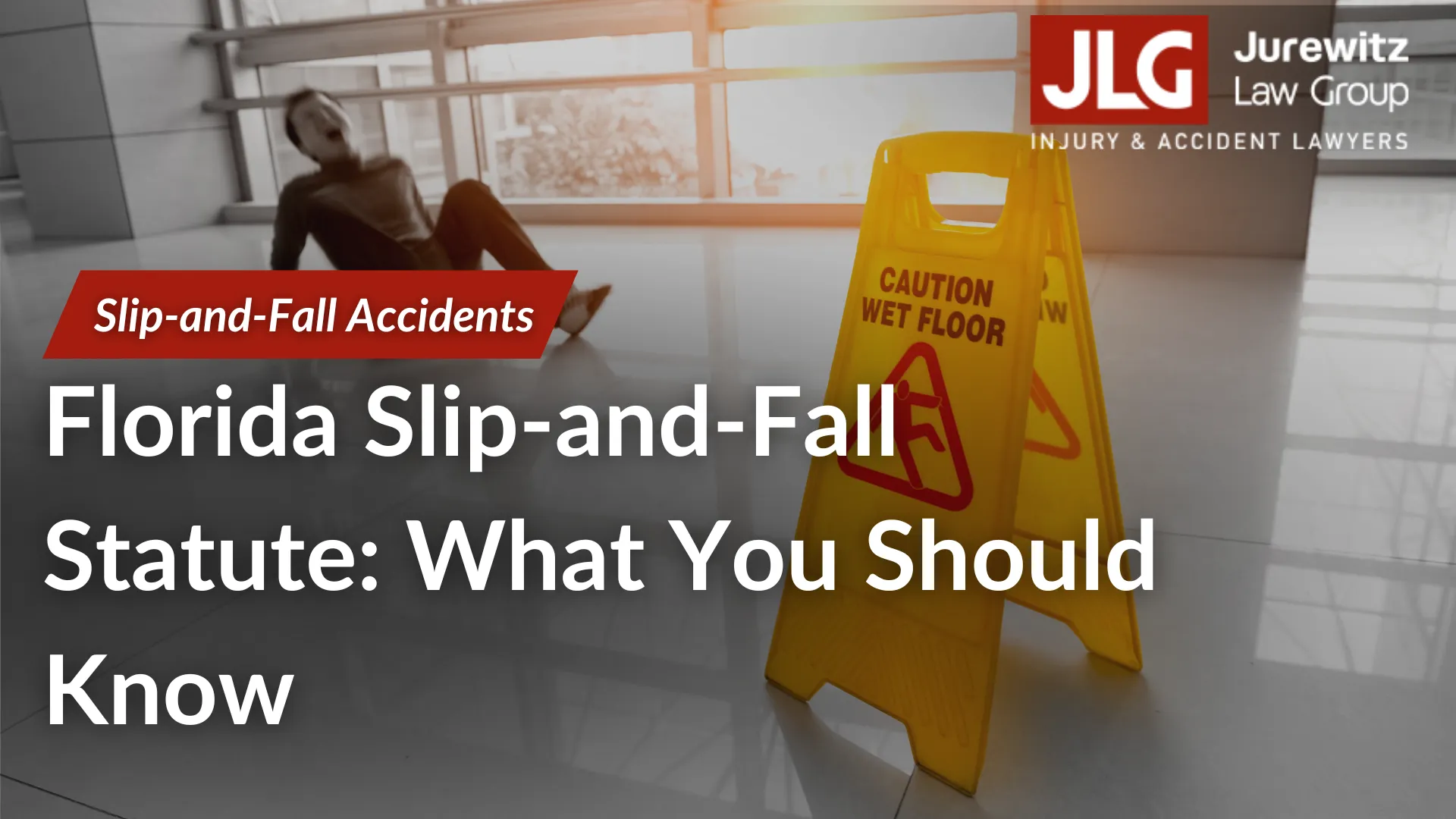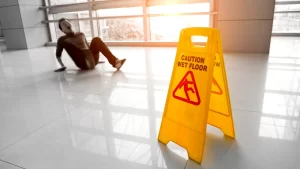
Have you recently been hurt in a slip-and-fall accident at a Florida business? What important things should you know about Florida slip and fall law? You may have grounds to file an insurance claim or lawsuit if so.
To pursue compensation, you must show the slip and fall occurred due to the unreasonable carelessness of a business owner or property owner. However, you don’t have to show that the owner was the individual whose lack of action caused your injuries. For example, maybe you were hurt in a slip and fall at a Florida store because an employee failed to address a hazard in a timely manner.
The employee’s carelessness may have directly caused the slip and fall. Still, ownership is liable because it’s the owner’s job to train employees to address such hazards properly.
Slip and Fall Liability in Florida: What Florida Statute § 768.0755 Says
Unsure about what to do to follow Florida slip and fall law? Slip and fall liability in Florida is based on the legal principle of negligence. Per the law, you don’t automatically have a right to receive compensation simply because you sustained injuries in a slip and fall at a business. To be eligible for compensation, you must show the following:
- The “business entity” had “actual or constructive knowledge of the dangerous condition” that caused the slip and fall
- By the time the slip and fall occurred, the business owner or a representative of the business (such as an employee) “should have action to remedy” the condition that resulted in the slip and fall
Your goal is to show you sustained injuries as a result of unreasonable carelessness. If you hurt yourself in a slip and fall because of a hazardous condition no one could have known about, you may not be eligible for compensation.
What is the Eggshell Plaintiff Rule in Florida?
Insurance companies and defendants may use a variety of tactics to avoid paying a victim. One tactic may be to argue that a victim is physically frail and thus prone to injury. Luckily, per Florida’s eggshell plaintiff rule, such an argument doesn’t prevent you from being eligible for compensation.
What is Constructive Knowledge in Slip and Fall Accidents?
Under Florida law, showing that a business had constructive knowledge of a hazard resulting in a slip and fall may involve showing either of the following:
- The dangerous condition that caused the slip and fall (like a spill on the floor of a supermarket) existed for a long enough time that a reasonable business owner or employee would have discovered it by the time the slip and fall occurred.
- The condition that caused the slip and fall was one that developed or occurred regularly. Thus, a business owner should have predicted it might cause an accident, and thus should have taken steps to guard against such occurrences.
What You Need to Know About the “But-for” Causation Test in Slip and Fall Accidents
What should you know about Florida slip and fall law regarding fault? Proving a business owner negligently overlooked a condition that resulted in a slip and fall claim doesn’t automatically result in a payout. You may also need to prove that, were it not for the business’s negligence, you would not have sustained injuries.
Consider the following example: You trip over an item that fell to the floor at a shop. If no other factors contributed to the slip and fall, you may argue you would not have sustained injuries but for ownership’s negligence.
However, maybe your own carelessness played a role in the slip and fall. For example, perhaps you didn’t see the item on the floor because you were texting or otherwise on your phone immediately prior to the slip and fall. In this scenario, an insurance company or defendant might argue that you could have avoided injuries had you been paying more attention.
How Contributory Fault Works in Florida Slip and Fall Cases
Unsure of what should you know about Florida slip and fall law? Per Florida’s contributory fault law, you may still be eligible to receive compensation when your own negligence contributes to your injuries. You may still receive compensation as long as the percentage of fault assigned to you for an accident isn’t greater than 50 percent.
To return to the above example, maybe you are 30 percent to blame for the slip and fall. That means the most compensation you could receive would be 30 percent less than what you might receive if the business was entirely to blame. For instance, if you could have received $10,000 had the business been solely responsible for the slip and fall, now you may only receive $7,000.
Proving Liability in Slip and Fall Cases
Taking proper steps immediately after a slip and fall can help you prove liability when filing a claim later. Steps to take are:
- Reporting the slip and fall to an employee or manager
- Not saying anything to suggest you caused the slip and fall
- Asking the manager or employee to save any footage of the accident that may be available
- Getting the names and contact information of witnesses (and recording their statements at the scene if they will let you)
- Taking pictures of the condition that caused the slip and fall
- Taking pictures of any visual signs of your injuries
See a doctor as soon as possible. Even if you don’t think you’ve sustained injuries, seeing a doctor is essential. A slip and fall can lead to injuries (like a concussion) that may not cause immediately noticeable symptoms.
Damages in Slip and Fall Cases in Florida
 If you reach a settlement with an insurance company, you receive compensation. The term is “damages” when a jury awards money at a trial.
If you reach a settlement with an insurance company, you receive compensation. The term is “damages” when a jury awards money at a trial.
The damages a jury may award include:
- Economic damages
- Non-economic damages
A jury may award economic damages to compensate you for losses resulting from your injuries that have exact dollar values. Medical bills and lost wages are common examples of such losses. You may receive non-economic damages for losses that don’t have objective dollar values, like pain and suffering.
A jury may also award punitive damages. Punitive damages serve to punish a defendant for their misconduct. Although not unheard of, punitive damages are uncommon in slip-and-fall cases.
Statute of Limitations for a Slip and Fall in Florida
What are the statute of limitations slip and fall Florida deadlines? Don’t wait to take legal action after a Florida slip and fall injury. You have two years from the date of the accident to file a lawsuit. You won’t be eligible for compensation if you miss the deadline on premises liability laws in Florida.
Contact a Florida Slip-and-Fall Lawyer
What should you know about Florida slip and fall law? Speak with an Tampa premises liability attorney familiar with slip and fall law in Florida to learn more about your legal options. Our personal injury lawyers can get you the compensation you deserve, while recovering damages and proving negligence. At Jurewitz Law Group Injury & Accident Lawyers, our team of slip and fall attorneys can assist you with everything from slip and fall accident evidence collection to representing you at trial. Learn more by contacting us online or calling our firm at (619) 233-5020 for a free case review.


